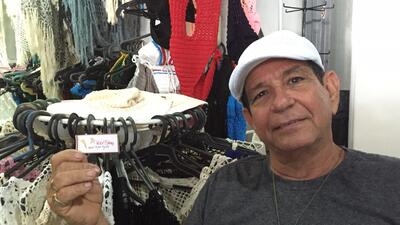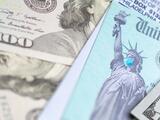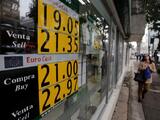From bikinis to burgers, Cuba’s private sector gets boost from Obama

By David Adams in Havana dadams7308
Víctor Rodríguez, 66, holds up his pride and joy, a skillfully crocheted black and white bikini thong that is his contribution to Cuba’s booming private sector economy.
”Welcome to my store, ‘Víctor Bikiny,’” he said proudly, surveying the small forty square-foot kiosk where he sells a range of hand-crafted clothing at ‘La Feria,’ a covered market in Old Havana bustling with some 500 small businesses.
“This is the new Cuba, everything you see is the product of free enterprise, Made in Havana,” he added.
Entrepreneurs like Rodríguez represent a major plank in President Barack Obama’s new U.S. policy of normalization with Cuba’s communist government, designed in large part to foster private sector growth as the Cuban government opens up its socialist, state-run economy.
After holding private talks with Cuban leader Fidel Castro on Monday, Obama met with local Cuban small business entrepreneurs during his first full day of meetings during a historic two-day state visit to the island, the first by a U.S. president since 1928.
Obama extolled "the power of entrepreneurship" in a brief speech. "It’s about self-determination, the opportunity to forge your own future," he said.
The White House makes no secret that its policy of engagement is designed to help Cuba move away from its communist economic and political model. "Cuba’s economic future ... depends on growth in the private sector, as well as government action" he said. "America wants to be your partner."
For decades the Cuban government stifled private enterprise in Cuba, denouncing capitalism as an evil tool of Yankee “imperialism” to undermine the island’s 1959 socialist revolution.
Sweeping changes
But after Cuba’s former president Fidel Castro stepped down due to ill health in 2006, his brother Raul Castro has gradually implemented sweeping changes to modernize the island’s economy, including the privatization of thousands of inefficient state-run companies, and vowing to lay off one million state workers.
The private sector has tripled in the last five years, and today there are about 500,000 privately employed small business workers in Cuba, amounting to 11% of the professional workforce, according to Phil Peters, a U.S. consultant who has studied Castro’s economy for 20 years.
Inefficient state farms have also been converted to agricultural cooperatives, raising the overall private sector share of the workforce as high as 25%, Peters said.
“Cuban officials have said they expect to get to 45%,” he said. “It’s clear to me there has been a sea change in the Cuban economy,” he added.
Havana’s streets once lined with drab state-run stores with few products to offer and unmotivated employees, are today bustling with new commercial activity as private businesses are popping up everywhere; barbershops, pastry stores, pizza and burger joints, high end restaurants and B&Bs, as well as cellphone services, language schools, kindergartens and real estate agencies.
“This is revolutionary, we are learning as we go along,” said Mario Martinez, 31, manager of Tamy’s Cakes an air-conditioned pastry store that opened in 2014 and now has 10 employees.
The store had a steady stream of customers on Sunday. “We need more places like this. The quality is good. Much better than what we had before,” said Juana Molina, a school teacher who stopped by to buy a birthday cake.
Garden products
A few blocks away Hermes Perdomo, a 70-year-old civil engineer, tended a garden products store in the front patio of his house packed with potted plants and cactus.
“We Cubans are tremendous workers, we can make anything but there are a thousand things we don’t have access to,” he said, standing in a carpentry workshop on the roof where he makes garden furniture.
Private sector growth in Cuba remains uncertain due to strict limits on what kind of businesses are licensed to operate, as well as Cuba’s state monopoly on imports and exports and access to wholesalers.
Cuban entrepreneurs are handicapped by the five decades-old U.S. embargo that bans trade with Cuba in many areas. The Obama administration has chipped away at the sanctions as part of its December 2014 initiative to normalize relations with Cuba, but its efforts to lift the embargo have been blocked by the Republican-controlled Congress.
"We think the U.S. government can take more steps to send clear and direct signals in this direction," Foreign Trade Minister Rodrigo Malmierca told reporters on Sunday.
In addition, Malmierca complained the measures taken by the Obama administration so far revealed a “discriminatory bias” against Cuba’s state sector “which the sovereign Cuban people have chosen as the preferred form of the national economy.”
Perdomo said he had tried to buy moulds to make garden statues on Ebay only to find the website does not permit sales to Cuba due to U.S. financial sanctions.
Licenses declined
“There is certainly a quantitative boom since late 2010, however qualitatively there’s still a lot to be desired,” said Ted Henken, a sociology professor at City University of New York and co-author of the book ‘Entrepreneurial Cuba.’
In the last nine months the number of license holders has actually declined according to official Cuban statistics, he noted, citing oversaturation of the limited professions permitted.
“It’s hit a wall and unless they double down on the reforms it won’t grow anymore,” he said.
It remains unclear how far Cuba is willing to expand the private sector which has suffered its ups and downs over the last two decades.
In the early 1990s Fidel Castro experimented with limited private sector reforms when the island’s economy was thrown into freefall after the collapse of the Soviet Union, Cuba’s former ally and principal trading partner.
But he reversed course a few years later after a socialist ally, Hugo Chavez, took power in oil-rich Venezuela and quickly came to Cuba’s rescue.
But the recent collapse of oil prices has thrown Venezuela into political and economic turmoil, threatening to undo its commercial relations with Cuba.
“There is still a straight-jacket mentality of allowing the non-state sector the crumbs off the table,” said Henken. “The state is downsizing but at the same time it needs to get out of the way so they can create jobs and innovate,” he added.
“This is an irreversible process because the state has no other option. Raul Castro has said it himself,” said Rodriguez, who now employs 40 women around the city who sew his clothes at home.
Related stories:




